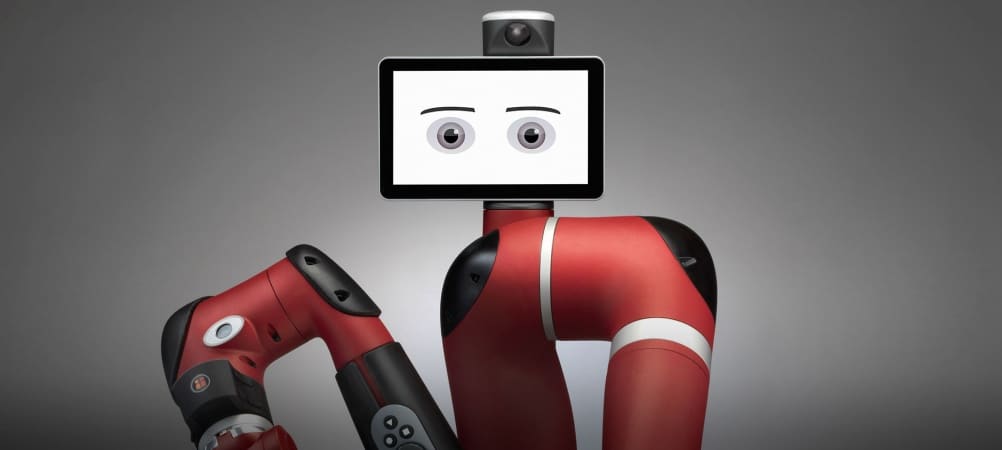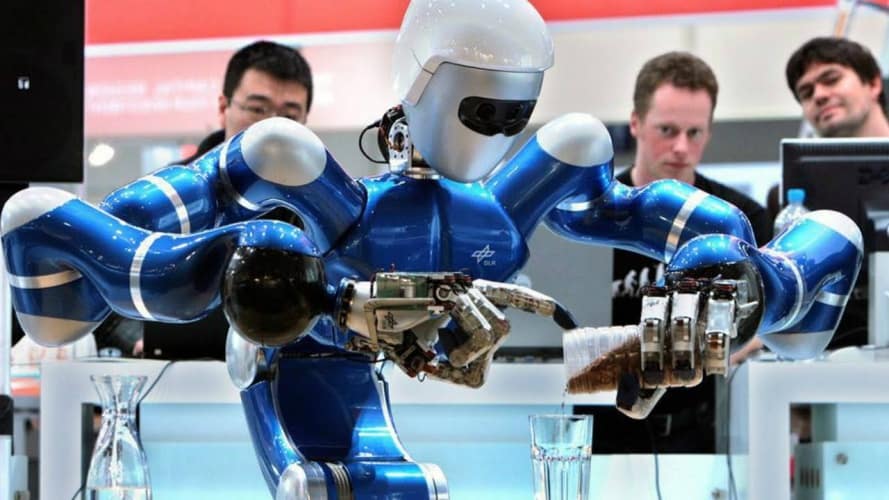 Andrew Wade, senior reporter
Andrew Wade, senior reporter
In a week where the Tories made ludicrous proposals for foreign workers that echoed the 1930s, I had the pleasure of attending a couple of conferences where people actually spoke intelligently.
Among the speakers at the FT’s Future of Manufacturing Summit on Tuesday was Rodney Brooks, founder and CTO of Rethink Robotics. The company’s Baxter and Sawyer robots are at the forefront of a new wave of industrial automation, where machine learning and artificial intelligence are embedded, and new tasks can be taught without the need for complex programming.

Rethink’s robots are designed to work alongside humans on the factory floor, and the situational awareness provided by their sensors means they don’t require safety cages. Coming in at around $30,000, this next generation of machines is accessible to SMEs who may never previously have had automation in their factories, and who can make a return on investment within just a couple of years.
Baxter and Sawyer are deployed in manufacturing businesses around the world, but China, in particular, has been a huge area for growth. According to Brooks, factories there have 15 per cent labour turnover per month, which doesn’t leave much scope for on-the-job training. As a result, intuitive automation systems are essential, where little or no expertise is required to operate them.
In Europe and the US, the manufacturing workforce tends to be older than in Asia. Brooks says this makes upskilling on technical systems more challenging, and is one reason why Rethink’s user-friendly robots have also been successful in these markets.

According to the CTO, collaborative robots such as Baxter and Sawyer will coexist with human workers in factories for the foreseeable future, and automation will not result in the mass unemployment that many fear (but I suppose he would say that). Brooks claims this is partly due to the shift in demographics across factory floors. Even in China, many workers are turning away from manufacturing and pinning their professional hopes on the country’s burgeoning services sector. In the West, manual labour on the factory floor is no longer as desirable a career as it once was, resulting in the aforementioned ageing workforce.
Engineers will continue to be required, but as the number of low-skilled workers in manufacturing dwindles, Brooks believes that automation can take up the slack. But he says we tend to overestimate the rate at which technology advances, presuming that things like robotics are on an exponential curve. Instead, he claims, the impact of the technology will be more subtle, and full factory automation is not something we’ll see in the short term.
Professor Noel Sharkey from Sheffield University is not so sure. Perhaps best known as the lead judge on the recently revived Robot Wars, the Belfast-born AI and robotics expert was presenting this week at the IET’s Engineering the Future Festival.

Always an engaging speaker, Sharkey entertained the Institute’s Kelvin Lecture Theatre with information about the latest sex robots, as well as exploring some of the ethical issues we face as AI and robotics advance. He claims that while automation across manufacturing could be worrying for employment, it’s service robots that will have a much bigger impact.
Industrial automation has been around for decades, and we currently have a total of about 1.5 million robots operating in factories around the world. However, the World Federation for Robotics predicts that by 2018, 38 million service robots will be sold annually. Automation up to this point has been mostly incremental, with workers able to migrate to where other jobs have been available. But now it’s infiltrating virtually every corner of the economy, and there is genuine concern that we are headed towards a world where humans are no longer required to keep the lights on and the wheels turning.

Some have suggested that Universal Basic Income could provide the answer, where all citizens are provided with a baseline income, regardless of wealth. Countries including Finland and the Netherlands have even launched pilot programmes. But others have been quick to point out the sense of value and self-worth that most of us derive from employment, and suggest this is not something we should so willingly concede to automation.
It’s a complex and enthralling issue, and one that will only gain more prominence over the coming years. Last year, Sharkey co-founded the Foundation for Responsible Robotics, an organisation that lobbies those in power to enact regulation without stifling innovation. Getting that balance right seems like an almost impossible task, but one that we must take on regardless. If the UK is planning on sending all foreign workers packing, a robot workforce may be needed sooner than we think.




JLR teams with Allye Energy on portable battery storage
This illustrates the lengths required to operate electric vehicles in some circumstances. It is just as well few electric Range Rovers will go off...